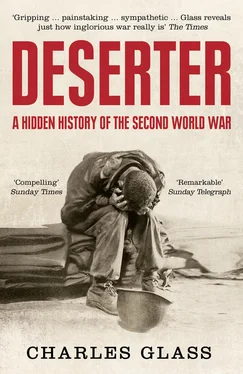Artie Whitehead was interred in ‘the family cemetery’ at Silver Point, Tennessee, ‘with generations of relatives: Whitehead, Hatfield, Sadler, and Presley.’ Alfred’s mother returned by train to Buffalo Valley with her children to live near ‘the one room, stone chimney, log house where I was born’. Young Whitehead’s rural upbringing was typical for the impoverished Southern hills of the time. His family sent him to school only a few weeks a year, ‘just enough to keep the authorities off their backs’. Even by the standards of the Depression-era South, his was a brutal childhood. Alfred’s great-grandfather, Wily Whitehead, who was ‘as old as the hills and senile’, lived in a henhouse with a rope tied around his waist to keep him in. Their stepfather treated the six Whitehead children still living at home so harshly that the county assumed custody of them for a time. Young Alfred enjoyed rare moments of freedom, usually alone fishing or shooting in the woods. For the most part, he wrote, his mother and stepfather robbed him of his youth:
They had me working in the fields from sunup to sundown: plowing, clearing land, and helping to make moonshine whiskey by the time I was nine. Other times, my stepfather would hire me out as a laborer to other farmers for fifty cents a day. Then he’d take all the money I made and drink it up, gamble it away, or spend it whoring around South Carthage, depending on the mood he was in.
The wartime army offered an escape from backwoods poverty and abuse. It was unlikely Whitehead needed his mother’s permission, though, to join it. His service records put his enlistment date at 11 April 1942. At that time, he was twenty. Parental consent was required only for volunteers younger than eighteen. Just as he must have been older than four at his father’s funeral, he was more than eighteen in 1942. Yet depicting himself as underage stressed his role as victim in the saga he was making of his life. He portrayed his departure from his mother in poignant terms: ‘She followed me all the way out to the front gate by the road, crying, and telling me that I had better get a good insurance policy in the Army. I couldn’t help remembering how she and my stepfather had squandered my dead father’s insurance money and property.’
For many relatively well-off young Americans, like Steve Weiss, the army was pure hardship. To Alfred T. Whitehead, it was liberation. The training and discipline were light compared to farm labour. The army supplied three meals a day, regular rations of meat, hot showers, clean clothes, medical care, a bed to himself and, above all, travel beyond the hills where he was born. Such luxuries were unobtainable for a poor rural Southerner, white or black, in civilian life.
Whitehead and other young recruits reported early one warm April morning to a restaurant in Carthage, Tennessee. Carthage, originally a trading port where the Cumberland and Caney Fork Rivers met, was known to Whitehead and the other recruits as the town from which the state’s most famous First World War veteran had embarked on his military career. Alvin Cullum York, having conquered alcoholism before the war to become a devout Christian and pacifist, was drafted into the Army in 1917 at the age of twenty-nine. Trained at Fort Gordon, Georgia, he served in France with the 82nd Division. On 8 October 1918, York earned the Medal of Honor. His citation, presented to him personally by General John J. Pershing, read:
After his platoon suffered heavy casualties and three other non-commissioned officers had become casualties, Corporal York assumed command. Fearlessly leading seven men, he charged with great daring a machine gun nest which was pouring deadly and incessant fire upon his platoon. In this heroic feat the machine gun nest was taken, together with four officers and 128 men and several guns.
York, about whom a Hollywood movie starring Gary Cooper had been released the year before, set a high standard for the young Tennesseans. Whitehead was proud to set out from the same town York had.
The recruits ate a hot breakfast at the little restaurant and boarded a bus. Driving along the ramshackle road past Whitehead’s family’s cabin at Sulphur Springs, Alfred wondered if he would ever see it again. It did not matter to him either way. While the driver filled the bus with petrol in Lebanon, he slipped away to buy ‘a jug of moonshine’. He and his companions drank the illegal alcohol before nightfall, when the bus entered the gates of Fort Oglethorpe, Georgia.
After a few weeks of kitchen duty and barracks cleaning at Fort Oglethorpe, Whitehead was shipped to Camp Wolters, Texas, for Basic Training. The Infantry Replacement Training Center, where Texan Audie Murphy trained with Company D of the 59th Training Battalion, was then the country’s largest. The nearest town was Mineral Wells, which some of the GIs called ‘Venereal Wells’ for obvious reasons. Whitehead became a buck private with about sixty other youngsters in the 4th Platoon, Company D, 63rd Infantry Training Battalion. His boyhood proficiency with a rifle qualified him as ‘sharpshooter’ and then ‘expert’. Despite his success and easy adaptation to military life, he hated the Texas heat and burning winds. ‘At night,’ he recalled, ‘I had to sleep with my blanket over my head just to breathe and keep the sand from stinging my face.’ Training lasted seventeen weeks. This short time, reduced from the previously standard fifty-two weeks, was necessitated by the urgent need for troops overseas. On completion of the course, Whitehead took a train to Camp Polk, Louisiana.
At Camp Polk, Whitehead was assigned to an ‘antitank platoon with Headquarters Company, 2nd Battalion, 38th Infantry Regiment of the 2nd Infantry Division’. On his shoulder was the divisional patch with an American Indian’s head for which the 2nd was called the Indian Head Division. The assignment gave him many advantages over men who would be sent overseas as replacements for regiments that had lost soldiers in combat. He would train with the men who were going to fight beside him, and his officers would know him.
Both the regiment and the division had honourable records of service. The 38th Regiment was called the ‘Rock of the Marne’ for its stiff resistance during the German offensive of 1918. The ‘Second to None’ Division’s bravery during the Meuse-Argonne offensive had earned it three Croix de Guerre from the French government. By 1942, the division’s main components were the 2nd, 9th and 38th Regiments, together with the 2nd Engineers Battalion, four field artillery battalions and support units.
The 2nd Infantry Division was at Camp Polk to take part in war games. The Louisiana Maneuvers had begun the year before as the largest ever on American soil, and they would be staged with new units each year of the war. Their objective was as much to find and correct flaws in American battle strategy, tactics, equipment and organization as to train the inexperienced troops. To Private Whitehead, the 1942 summer manoeuvres seemed ‘like a great game, much like my childhood games of hide-and-seek, where one would surprise the “enemy”’. Without enough weapons to equip all the troops, Whitehead and some of his comrades carried broomsticks instead of rifles and used empty mortar rounds as anti-tank guns. In some places, wooden signs saying ‘foxhole’ and ‘machine gun’ substituted for the real thing. The war games pitted ‘Reds’ against ‘Blues’ over 3,400 square miles of rugged swampland, hills and rivers. In the previous year’s exercises, General George Patton’s 2nd Armored had swept across the River Sabine into Texas to come back into Louisiana and trap the ‘Reds’ in Shreveport. The exercises included cavalry charges, relics of an earlier era that would not amount to much against the Wehrmacht.
Читать дальше












